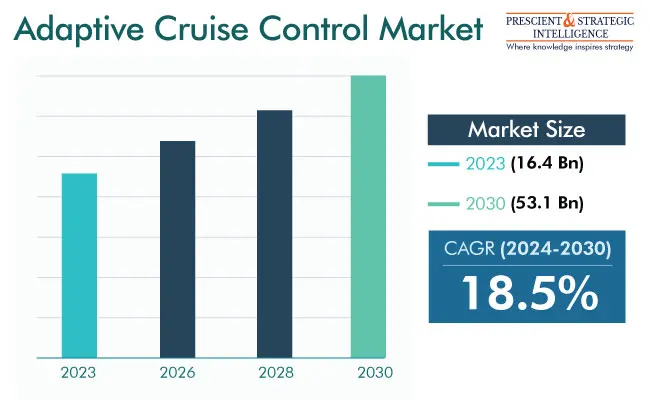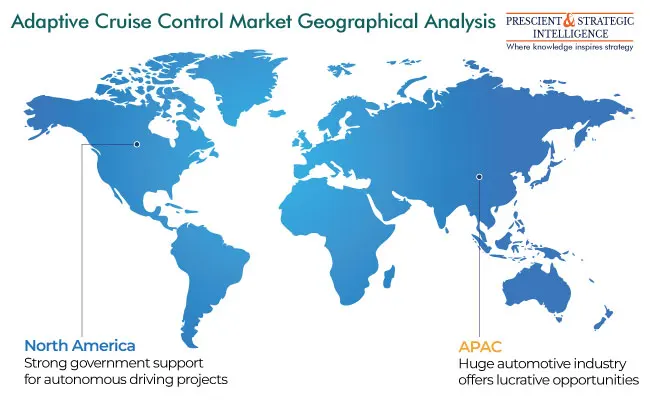Report Code: 11057 | Available Format: PDF
Adaptive Cruise Control Market Research Report - Size, Share, Key Trends, Growth Drivers, Regional Outlook, Revenue Estimation and Forecasts, 2024-2030
- Report Code: 11057
- Available Format: PDF
- Report Description
- Table of Contents
- Request Free Sample
Adaptive Cruise Control Market Overview
The size of the adaptive cruise control market has been estimated at USD 16.4 Billion in 2023, and it will touch USD 53.1 Billion by 2030, powering at a rate of 18.5% between 2024 and 2030.
The growing need for autonomous vehicles because of safety concerns, constant improvements in sensor technology, and government guidelines encouraging advanced driver assistance systems are the major industry drivers.

- The demand for automotive sensor will reach USD 58,215.3 million in 2030.
Moreover, as per the U.S. National Highway Traffic Safety Administration:
- Driver error caused an estimated 94 percent of motor vehicle accidents.
Adaptive cruise control is a system intended to assist automobiles in maintaining a proper/safe following distance and staying within the speed limit. Adaptive cruise control utilizes sensors including cameras or radar to recognize traffic circumstances and can automatically decelerate or accelerate in order to remain a safe interval from the front vehicle. This technology reduces the driver’s need for continuous manual corrections of speed in different traffic situations and thus improves comfort and safety overall.
Driver
- Technological improvements: The improvements in camera, radar, and lidar technology open up the opportunity to develop high-end adaptive cruise control systems at affordable cost. These developments will further speed up the adoption of adaptive cruise control in the coming years.
- Rising government guidelines: Governments worldwide realize the essential role of ADAS features in public road safety and adopt laws that require or promote their use on new automobiles. These rules are likely to increase the requirement for adaptive cruise control in the years to come.
The EU's new “Vehicle General Safety Regulation” starts applying in July 2022.
- It introduces various compulsory advanced driver assistant systems to enhance road safety and establishes the legal framework for the approval of fully driverless and automated vehicles in the EU.
- The new safety initiatives will assist in protecting pedestrians, cyclists, and passengers across the EU.
- This is expected to save more than 25,000 lives, and prevent around 140,000 severe injuries by 2038.
- Growing need for Advanced Driver Assistance Systems, or ADAS: There is a growing demand for ADAS in vehicles from customers who believe that such features make driving safer and more comfortable. One of the most widely used ADAS features is adaptive cruise control.
For instance, the global demand for advanced driver assistance systems will reach USD 72.2 billion in 2030.
- Increasing disposable incomes: In developing nations, customers are observing growing disposable incomes, which is driving the need for ADAS-featured cars. This will significantly boost the expansion of the industry in the years to come.
Trend
The incorporation of cutting-edge technology is a major trend in the industry aimed at improving safety, along with boosting overall system performance. Manufacturers continued to integrate ML and AI algorithms to allow adaptive cruise control systems to adapt to several complex driving patterns. These developments were targeted at making adaptive cruise control more convenient in various road conditions and traffic situations, contributing to a safer and smoother experience of driving.
- For instance, the Mobileye Super Vision, launched in 2021, utilizes AI to continuously monitor the environment through 11 cameras as well as supporting radar fusion perception.
The shift towards vehicle-to-everything (V2X) communication is also a notable trend in this industry. The V2X communication integration enabled adaptive cruise control systems to interact with infrastructure, other vehicles, and even pedestrians due to the evolution of connected & autonomous vehicle technologies. This advanced communication enabled greater collaborative and road-aware driving, where vehicles can share their position, intentions, or speed, resulting in enhanced traffic flow as well as improved overall road safety.
- For instance, Ford declared their commitment to deploying cellular vehicle-to-everything, or C-V2X, technology in every new vehicle model in the U.S. beginning in 2022.
Challenge
- Cybersecurity risks: Adaptive cruise control depends on software and sensors, which are susceptible to cyberattacks. It is important to ensure strong cybersecurity policies that would prevent potential hacks as well as safety risks.
- Dependability & efficiency: There are concerns about whether adaptive cruise control is a reliable or effective system in different driving conditions. In some cases, heavy traffic and bad weather or complex road scenarios may exceed the limits of the technology thus causing driver frustration or being a potential threat to safety.
For instance, the U.S. National Highway Traffic Safety Administration in December 2022:
- opened 2 new special investigations into crashes involving Tesla vehicles,
- where ADAS is suspected to have been in use.
- Customer consciousness & education: Many drivers remain completely uninformed about adaptive cruise control and might even hold false beliefs regarding its functionality. Wider adoption requires consumer education with regard to the technology and its limits.
- Cost: A major challenge is the high cost of this system, specifically those utilizing advanced sensors such as lidar. This can discourage customers, particularly within the budget-sensitive sections.
OEM Account Larger Share
The OEMs category, based on end-use, accounted for the larger share of the industry. This can be because the OEMs have widely integrated adaptive cruise control systems into vehicles, whether it is as a built or optionally included feature. The prevalence of adaptive cruise control in OEM automobiles underlines its mainstream status, with the systems regularly covered by standard warranties. Additionally, the dedication of this industry towards progressing safety and automation makes automotive adaptive cruise control a key technology defining today’s autonomous landscape. Such innovations and consumer demand will allow the industry to grow continuously.
| Report Attribute | Details |
Market Size in 2023 |
USD 16.4 Billion |
Revenue Forecast in 2030 |
USD 53.1 Billion |
Growth Rate |
18.5% CAGR |
Historical Years |
2017-2023 |
Forecast Years |
2024-2030 |
Report Scope |
Market Trends, Drivers, and Restraints; Revenue Estimation and Forecast; Segmentation Analysis; Impact of COVID-19; Companies’ Strategic Developments; Market Share Analysis of Key Players; Company Profiling |
Explore more about this report - Request free sample
Passenger Vehicle Is Largest Contributor
The passenger cars category, on the basis of application, is the largest contributor to the industry. This can be mainly ascribed to the strict government rules to equip vehicles with driver assistance systems to enhance vehicle safety. Moreover, the surging vehicle production across the globe is also a major reason for the largest share of this category. With substantial expenses in research & development and constant technological improvements by auto manufacturers, adaptive cruise control systems are becoming easier to utilize and more cost-effective in every vehicle model.
For instance, the China Passenger Car Association, in 2023:
- 21.7 million units of passenger cars were sold, up 5.6% year-on-year.
- Furthermore, China's passenger cars retail sales touch 2.35 million units, a growth of 8.5% yearly.
North America Is Leading Market
North America is the largest contributor to the industry. This can be primarily because of the growing demand for commercials & luxury vehicles and strict government rules imposed to control motor accidents in the continent. Adaptive cruise control is necessary because it allows to enhance vehicle safety, which increases customers’ reliability. Moreover, as fleet operations continue to become more popular across the region, the acceptance of adaptive cruise control is increasing significantly.
- In 2022, Mercedes-Benz USA sold 286,764 passenger vehicles in the U.S., an increase of 4% from 2021.
In North America, the U.S. is a major contributor, because of the rising customer consciousness about the advantages of having an adaptive cruise system in their cars. Furthermore, automotive companies are also providing other customization options as a result of increasing disposal Income among customers in the region.

Competitive Landscape
The adaptive cruise control industry is fragmented in nature, and dominated by mainly tier-1 suppliers. Major players have taken various measures over the past few years, including product launches, facility expansions, and mergers & acquisitions to increase their competitive advantages.
- In May 2023: Mobileye, a subsidiary of Intel Corporation, declared collaboration with Porsche to provide “Mobileye’s SuperVision”, a premium advanced driver assistance system, in upcoming Porsche models.
- In January 2022: Mobileye launched the “EyeQ Ultra”, a high-performing SoC purpose-built for autonomous driving.
Major Player in the Adaptive Cruise Control Market
- Robert Bosch Stiftung GmbH
- Denso Corporation
- INA-Holding Schaeffler GmbH & Co. KG
- Zeppelin-Stiftung Ferdinand gGmbH
- Valeo SA
- Magna International Inc.
- Aptiv PLC
- HL Holdings Corporation
- Autoliv Inc.
- Hyundai Motor Company
- Intel Corporation
- Stellantis NV
Want a report tailored exactly to your business strategy?
Request CustomizationWant an insight-rich discussion with the report author?
Speak to AnalystOur dedication to providing the most-accurate market information has earned us verification by Dun & Bradstreet (D&B). We strive for quality checking of the highest level to enable data-driven decision making for you
Our insights into the minutest levels of the markets, including the latest trends and competitive landscape, give you all the answers you need to take your business to new heights
With 24/7 research support, we ensure that the wheels of your business never stop turning. Don’t let time stand in your way. Get all your queries answered with a simple phone call or email, as and when required
We take a cautious approach to protecting your personal and confidential information. Trust is the strongest bond that connects us and our clients, and trust we build by complying with all international and domestic data protection and privacy laws